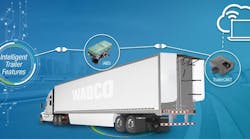ATLANTA – Fleets are accustomed to having ready access to the precise location and condition of their power units, but for trailers, not so much—yet there’s clearly a need, emphasized Pat Kealy, trailer sales leader, WABCO North America, speaking during the company’s press conference at the American Trucking Associations’ Technology & Maintenance Council Annual Meeting here this week.
“While most trucks today are outfitted with some type of diagnostic telematics, nearly 80% of fleets do not use any trailer telematics that could help reduce downtime related to their pain points,” said Kealy.
Looking to fill the gap, the global supplier of braking control systems has introduced the WABCO intelligent trailer platform. The new system is built on four key technologies—an Intelligent Anti-Lock Braking System (iABS), trailer Anti-Lock Braking System (ABS), Intelligent Trailer Program (ITP) and TrailerCAST—as well as open software architecture to facilitate cooperation with key industry players.
The iABS is “the brain” for the connected trailer, added Collin Shaw, Director, Business Development and Marketing, WABCO North America. Introduced in 2019, the WABCO iABS help optimize trailer control during emergency braking. Additionally, iABS enables the activation of ITP features including Lift Axle Control, Door Ajar and Axle Load Monitoring. WABCO has sold close to 6 million Trailer ABS systems in North America, the company reports.
“Our new trailer platform is a simple solution for customers that leverages iABS to receive, process and distribute critical trailer health information,” Shaw said. “Through iABS, our trailer platform helps fleets gain invaluable insight into previously difficult-to-access ABS information while also acting as a gateway for WABCO’s ITP and integrations from other partners. Looking to the future, WABCO’s position in truck and trailer braking will facilitate true connectivity between truck and trailer, helping to pave the way to higher levels of safety and efficiency.”
Indeed, the intelligent trailer platform is a key milestone in fulfilling WABCO’s mission to provide a more robust connection between the truck and the trailer, enabling fleets and other strategic partners to identify and proactively manage critical safety and diagnostic issues, according to the company. Along with WABCO’s extensive portfolio of trailer products, strategic partners such as vehicle diagnostics provider Noregon and trailer axle manufacturer Hendrickson have agreed to integrate their products and services into the connected trailer platform.
WABCO is working closely with trailer manufacturers and their fleet customers both to better understand their needs and to make the case for the WABCO platform as the best solution, Jon Morrison, president of WABCO Americas, explained to Trailer/Body BUILDERS. He pointed out that WABCO has an built-in competitive advantage in that all trailers need ABS systems, and the new platform is built into iABS, so there is no need for a second processing unit to be installed. He also noted the iABS brain is designed with more than enough capacity to meet rapidly evolving fleet expectations.
He pointed to Great Dane’s FleetPulse telematics platform, which incorporates the WABCO iABS, as an example of one such approach already in the marketplace.
“We supply a very large amount of trailer ABS to the industry, so we have to really be adaptable to the different strategies of each OEM and what they want to do,” Morrison said. “We want to try to incorporate something for them that is also easy from an assembly and a sales perspective. You can’t have a lot of complications building a trailer—we just take all of these things into consideration.”
WABCO is also launching its TrailerCAST trailer telematics device for North America to enhance customer access to critical trailer information. In production globally since 2019, the TrailerCAST device provides GPS and cellular connectivity to iABS and its associated intelligent features. Available with and without battery backup, TrailerCAST is able to provide a GPS location for trailers across North America. Additionally, with its 4G cellular connection, TrailerCAST can transmit critical trailer information to WABCO’s data cloud and fleets can access this information in real-time through Noregon’s TripVision.





